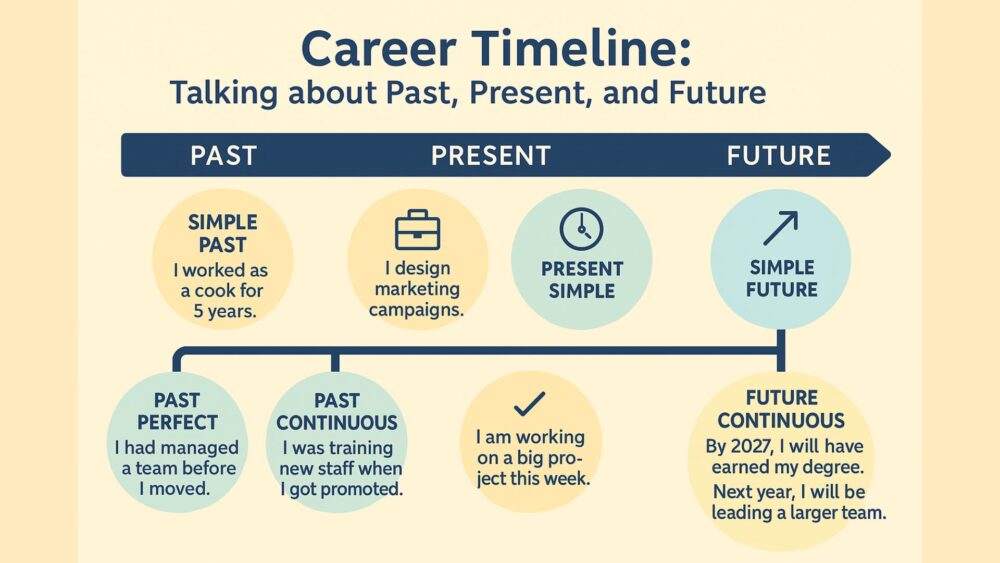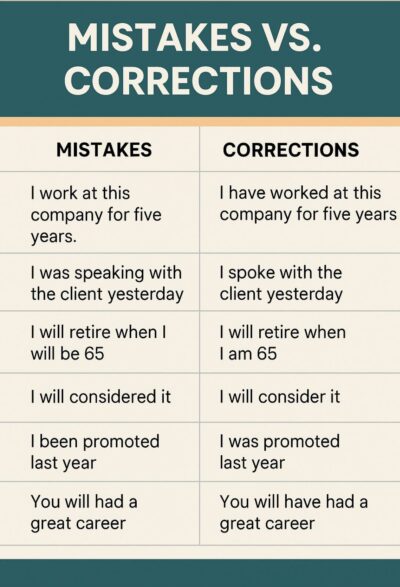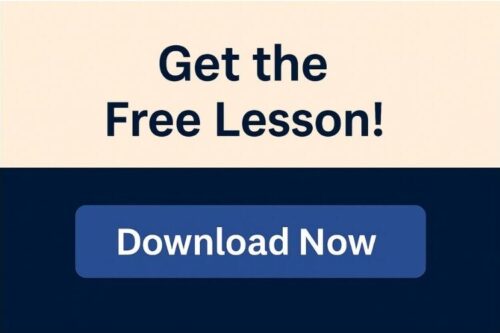Talking about your career in English is one of the most important skills adult learners can master. Whether you are preparing for a job interview, sharing your background with coworkers, or planning future goals, being able to tell your career story builds both confidence and opportunity. In this post, you’ll learn how to use different English tenses, key vocabulary, and practical strategies to describe your past, present, and future career. You’ll also find free resources you can download and try right away.

If you’re just starting out, you may want to review our post on How to Introduce Yourself in English before jumping into career conversations.
Guess what? When you click and buy through our links, you’re doing more than improving your game. You’re supporting us in a way that doesn’t cost you extra but helps us keep bringing you the best drills and tips. It’s a slam dunk for both of us!
Summary
- Why career conversations matter for English learners
- How to use past, present, and future tenses to describe a career
- Key career vocabulary with real examples
- Listening and speaking practice ideas, including a Beatles song activity
- Common grammar mistakes and how to avoid them
- Tips for writing a career story or resume
- Free downloadable worksheet sample from the lesson
Table of Contents
- How Can You Talk About Your Career in English with Confidence?
- Why Are Career Conversations Important for ESL Learners?
- How Do English Tenses Build a Career Timeline?
- Which Past Tenses Help You Describe Work History?
- How Do Present Tenses Show What You Do Now?
- How Do Future Tenses Express Goals and Dreams?
- What Vocabulary Do You Need to Talk About Your Career?
- How Can Listening and Speaking Practice Build Fluency?
- How Does Music Help You Learn English?
- What Are Common Mistakes to Avoid When Talking About Your Career?
- How Can You Write Your Career Story in English?
- Where Can You Find More Practice and Support?
- Final Thoughts, Backlinks & Call to Action
How Can You Talk About Your Career in English with Confidence?
Being able to talk about your career in English shows others your experience, skills, and goals. It’s also one of the most common topics in interviews and workplace conversations. Using the right tense helps you clearly communicate whether you’re describing a past job, your current work, or your future plans.
Why Are Career Conversations Important for ESL Learners?
Career conversations matter because they happen everywhere: in job interviews, in the workplace, at networking events, and even in small talk. If you can explain what you’ve done, what you do now, and what you hope to do, you will open new doors in both work and daily life.
For more practice with personal introductions, check out How to Introduce Yourself in English.
How Do English Tenses Build a Career Timeline?
English tenses act like a timeline. They help you show when something happened, is happening, or will happen. Here’s a simple way to look at it:

- Past Tenses → Describe your work history and previous jobs.
- Present Tenses → Talk about your current responsibilities and duties.
- Future Tenses → Share your goals, dreams, and career plans.
Which Past Tenses Help You Describe Work History?
- Simple Past: I worked at a bakery for five years.
- Past Continuous: I was managing a team when the company closed.
- Past Perfect: I had finished my degree before I got my first job.
How Do Present Tenses Show What You Do Now?
- Present Simple: I teach English to adult students.
- Present Continuous: I am working on a new training project.
How Do Future Tenses Express Goals and Dreams?
- Simple Future: I will apply for a management position next year.
- Future Continuous: I will be studying for my certification.
- Future Perfect: By 2030, I will have completed my master’s degree.
What Vocabulary Do You Need to Talk About Your Career?
Career English uses specific vocabulary. Here are a few useful words and collocations:
- apply for a job
- get promoted
- earn a degree
- attend an interview
- gain experience
- lead a team

These examples are from the lesson’s picture dictionary. You can download the sample below and see the full version in the complete TPT lesson.
How Can Listening and Speaking Practice Build Fluency?
The best way to build fluency is practice. You can:
- Try role-plays for interviews or workplace conversations.
- Record yourself answering common career questions.
- Do listening activities with workplace vocabulary.

We’ve shared other fun music-based ESL lessons too—take a look at ESL Listening Practice with Songs.
H2: How Does Music Help You Learn English?
Music makes language learning more enjoyable. In this lesson, students practice with A Hard Day’s Night by The Beatles. The song talks about working hard and relaxing after work—perfect for career English practice.
What Are Common Mistakes to Avoid When Talking About Your Career?
Some of the most common mistakes are:
- Mixing up verb tenses (❌ I work yesterday → ✅ I worked yesterday)
- Forgetting time expressions (❌ I was manager → ✅ I was a manager in 2010)
- Using the wrong prepositions (❌ apply job → ✅ apply for a job)

How Can You Write Your Career Story in English?
A simple career story includes your past, present, and future. For example:
“I started as a cashier. Now, I am a shift supervisor. In the future, I want to become a store manager.”
Strong grammar makes a difference here. You can review our guide on Subject and Object Pronouns in English to strengthen your writing.
Where Can You Find More Practice and Support?
There are many tools to help you practice:
- italki for one-on-one tutors
- Rocket Languages for structured lessons
- English Class 101 for audio and video practice
- Mondly for mobile practice
These affiliate resources give you extra practice outside of the classroom.
Final Thoughts
Talking about your career is a real-world skill every English learner needs. By practicing the tenses, vocabulary, and activities in this lesson, you’ll be able to confidently share your story in any situation.
What do you think? Was this lesson helpful? Let me know what you think. I’d love to hear from you.
Share your career goals or English learning tips in the comments below.
I always reply.
LearnEnglish #ESLlesson #CareerEnglish #EnglishGrammar #AdultESL #JobInterviewEnglish #ESLlistening #EnglishVocabulary #ESLteaching #TheBeatles



Hello Im timothy Willan a floor contractor for 40 years, Simple Past: I worked on installing hardwood floors
Past Continuous:. i learned How to do difference floors, laminate, Vinyl and Hardwood
Past Perfect: I had finished schooling for fixing and repairing All floors
Simple Future: I will retire
Future Continuous: I will be learning online business
Future Perfect: By 2026 will be making a living with online business, be retired from flooring.
I love music, I play and sing most all my life, i liked the video that’s in the Post, Thank you for a great post
Hi Timothy Willan, thanks for your comments. Simple past- good; past continuous-should be different floors; past perfect-good. Simple future-good; future continuous-learning an online business; future perfect-I will be making with an online business, and be retired.
Should be, I have played and sung most of my life.
Good job. Let me know if I can help, any time.
KBob